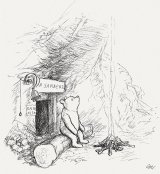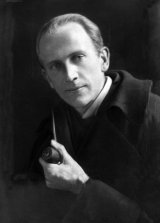Winnie-the-Pooh Page #16
"Winnie-the-Pooh" is a delightful children's book written by A. A. Milne. Set in the Hundred Acre Wood, the story follows the adventures of a lovable bear named Winnie-the-Pooh and his friends, including Christopher Robin, Piglet, Eeyore, Tigger, Rabbit, and Owl. Each chapter brings a new escapade, often involving honey, Pooh's favorite treat. From searching for the North Pole to getting stuck in Rabbit's front door, the characters embark on whimsical journeys full of humor, friendship, and simple joys. The book's charm lies in its gentle lessons about kindness, imagination, and the importance of treasuring the little things in life.
and he watched it floating slowly away in the distance, until his eyes ached with looking, and sometimes he thought it was the bottle, and sometimes he thought it was just a ripple on the water which he was following, and then suddenly he knew that he would never see it again and that he had done all that he could do to save himself. "So now," he thought, "somebody else will have to do something, and I hope they will do it soon, because if they don't I shall have to swim, which I can't, so I hope they do it soon." And then he gave a very long sigh and said, "I wish Pooh were here. It's so much more friendly with two." * * * * * When the rain began Pooh was asleep. It rained, and it rained, and it rained, and he slept and he slept and he slept. He had had a tiring day. You remember how he discovered the North Pole; well, he was so proud of this that he asked Christopher Robin if there were any other Poles such as a Bear of Little Brain might discover. "There's a South Pole," said Christopher Robin, "and I expect there's an East Pole and a West Pole, though people don't like talking about them." Pooh was very excited when he heard this, and suggested that they should have an Expotition to discover the East Pole, but Christopher Robin had thought of something else to do with Kanga; so Pooh went out to discover the East Pole by himself. Whether he discovered it or not, I forget; but he was so tired when he got home that, in the very middle of his supper, after he had been eating for little more than half-an-hour, he fell fast asleep in his chair, and slept and slept and slept. Then suddenly he was dreaming. He was at the East Pole, and it was a very cold pole with the coldest sort of snow and ice all over it. He had found a bee-hive to sleep in, but there wasn't room for his legs, so he had left them outside. And Wild Woozles, such as inhabit the East Pole, came and nibbled all the fur off his legs to make nests for their Young. And the more they nibbled, the colder his legs got, until suddenly he woke up with an Ow!--and there he was, sitting in his chair with his feet in the water, and water all round him! He splashed to his door and looked out.... "This is Serious," said Pooh. "I must have an Escape." So he took his largest pot of honey and escaped with it to a broad branch of his tree, well above the water, and then he climbed down again and escaped with another pot ... and when the whole Escape was finished, there was Pooh sitting on his branch, dangling his legs, and there, beside him, were ten pots of honey.... Two days later, there was Pooh, sitting on his branch, dangling his legs, and there, beside him, were four pots of honey.... Three days later, there was Pooh, sitting on his branch, dangling his legs, and there beside him, was one pot of honey. Four days later, there was Pooh ... And it was on the morning of the fourth day that Piglet's bottle came floating past him, and with one loud cry of "Honey!" Pooh plunged into the water, seized the bottle, and struggled back to his tree again. "Bother!" said Pooh, as he opened it. "All that wet for nothing. What's that bit of paper doing?" He took it out and looked at it. "It's a Missage," he said to himself, "that's what it is. And that letter is a 'P,' and so is that, and so is that, and 'P' means 'Pooh,' so it's a very important Missage to me, and I can't read it. I must find Christopher Robin or Owl or Piglet, one of those Clever Readers who can read things, and they will tell me what this missage means. Only I can't swim. Bother!" Then he had an idea, and I think that for a Bear of Very Little Brain, it was a good idea. He said to himself: "If a bottle can float, then a jar can float, and if a jar floats, I can sit on the top of it, if it's a very big jar." So he took his biggest jar, and corked it up. "All boats have to have a name," he said, "so I shall call mine The Floating Bear." And with these words he dropped his boat into the water and jumped in after it. For a little while Pooh and The Floating Bear were uncertain as to which of them was meant to be on the top, but after trying one or two different positions, they settled down with The Floating Bear underneath and Pooh triumphantly astride it, paddling vigorously with his feet. * * * * * Christopher Robin lived at the very top of the Forest. It rained, and it rained, and it rained, but the water couldn't come up to his house. It was rather jolly to look down into the valleys and see the water all round him, but it rained so hard that he stayed indoors most of the time, and thought about things. Every morning he went out with his umbrella and put a stick in the place where the water came up to, and every next morning he went out and couldn't see his stick any more, so he put another stick in the place where the water came up to, and then he walked home again, and each morning he had a shorter way to walk than he had had the morning before. On the morning of the fifth day he saw the water all round him, and knew that for the first time in his life he was on a real island. Which was very exciting. It was on this morning that Owl came flying over the water to say "How do you do," to his friend Christopher Robin. "I say, Owl," said Christopher Robin, "isn't this fun? I'm on an island!" "The atmospheric conditions have been very unfavourable lately," said Owl. "The what?" "It has been raining," explained Owl. "Yes," said Christopher Robin. "It has." "The flood-level has reached an unprecedented height." "The who?" "There's a lot of water about," explained Owl. "Yes," said Christopher Robin, "there is." "However, the prospects are rapidly becoming more favourable. At any moment----" "Have you seen Pooh?" "No. At any moment----" "I hope he's all right," said Christopher Robin. "I've been wondering about him. I expect Piglet's with him. Do you think they're all right, Owl?" "I expect so. You see, at any moment----" "Do go and see, Owl. Because Pooh hasn't got very much brain, and he might do something silly, and I do love him so, Owl. Do you see, Owl?" "That's all right," said Owl. "I'll go. Back directly." And he flew off. In a little while he was back again. "Pooh isn't there," he said. "Not there?" "Has been there. He's been sitting on a branch of his tree outside his house with nine pots of honey. But he isn't there now." "Oh, Pooh!" cried Christopher Robin. "Where are you?" "Here I am," said a growly voice behind him. "Pooh!" They rushed into each other's arms. "How did you get here, Pooh?" asked Christopher Robin, when he was ready to talk again. "On my boat," said Pooh proudly. "I had a Very Important Missage sent me in a bottle, and owing to having got some water in my eyes, I couldn't read it, so I brought it to you. On my boat." With these proud words he gave Christopher Robin the missage.
Translation
Translate and read this book in other languages:
Select another language:
- - Select -
- 简体中文 (Chinese - Simplified)
- 繁體中文 (Chinese - Traditional)
- Español (Spanish)
- Esperanto (Esperanto)
- 日本語 (Japanese)
- Português (Portuguese)
- Deutsch (German)
- العربية (Arabic)
- Français (French)
- Русский (Russian)
- ಕನ್ನಡ (Kannada)
- 한국어 (Korean)
- עברית (Hebrew)
- Gaeilge (Irish)
- Українська (Ukrainian)
- اردو (Urdu)
- Magyar (Hungarian)
- मानक हिन्दी (Hindi)
- Indonesia (Indonesian)
- Italiano (Italian)
- தமிழ் (Tamil)
- Türkçe (Turkish)
- తెలుగు (Telugu)
- ภาษาไทย (Thai)
- Tiếng Việt (Vietnamese)
- Čeština (Czech)
- Polski (Polish)
- Bahasa Indonesia (Indonesian)
- Românește (Romanian)
- Nederlands (Dutch)
- Ελληνικά (Greek)
- Latinum (Latin)
- Svenska (Swedish)
- Dansk (Danish)
- Suomi (Finnish)
- فارسی (Persian)
- ייִדיש (Yiddish)
- հայերեն (Armenian)
- Norsk (Norwegian)
- English (English)
Citation
Use the citation below to add this book to your bibliography:
Style:MLAChicagoAPA
"Winnie-the-Pooh Books." Literature.com. STANDS4 LLC, 2025. Web. 23 Jan. 2025. <https://www.literature.com/book/winnie-the-pooh_2005>.




Discuss this Winnie-the-Pooh book with the community:
Report Comment
We're doing our best to make sure our content is useful, accurate and safe.
If by any chance you spot an inappropriate comment while navigating through our website please use this form to let us know, and we'll take care of it shortly.
Attachment
You need to be logged in to favorite.
Log In